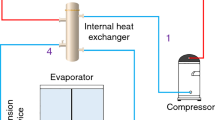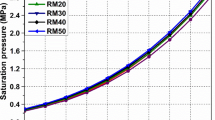Abstract
Climate change is an important environmental issue that is causing global temperatures to rise. The primary environmental targets are to reduce carbon emissions and mitigate the impacts of climate change. The refrigeration system is a major emitter of greenhouse gases because it uses refrigerants with a high global warming potential. Due to its excellent thermophysical properties, the R134a is the most commonly used refrigerant in refrigeration systems; however, its high GWP will need to be disposed of earlier. To achieve global environmental objectives, conventional refrigerants need to be replaced with environmentally friendly and energy-efficient refrigerants. In the present work, a mathematical simulation has been carried out to check the performance of low-GWP refrigerant mixtures as environmentally friendly alternatives for R134a in a low-temperature system. In this study, a 190-L domestic refrigerator has been considered a low-temperature system. This simulation was performed using the MATLAB software, and the REFPROP database was used to obtain thermophysical properties of the refrigerants. The results showed that the COP of HFO mixtures decreased by 4–20% compared to R134a. The exergy efficiency of the R1234ze/R134a mixture improves by 4 to 16% as compared to the other mixtures and its performance is very similar to the R134a. Due to the environmentally friendly properties and flammability aspects, R1234ze/R134a (90/10) could be a good substitute for R134a in lower temperature applications and to satisfy the Montreal and Kyoto Protocol expectations.












Similar content being viewed by others
Data availability
The datasets generated during this work are not publicly available; however, they are available upon reasonable request to the corresponding author.
Abbreviations
- A:
-
area (m2)
- C:
-
coefficient
- COP:
-
coefficient of performance
- D:
-
coil mean diameter (m)
- F:
-
empirical constant
- G:
-
mass flux (kg m -2 s -1)
- GWP:
-
global warming potential
- h:
-
specific enthalpy (J kg-1)
- L:
-
length (m)
- ṁ:
-
mass flow rate (kg s-1)
- Mo:
-
molecular weight (g kmol-1)
- n:
-
polytropic index
- Nu:
-
Nusselt number
- P:
-
pressure (kPa)
- Pr:
-
Prandtl number
- Q:
-
heat (J)
- Ra:
-
Rayleigh number
- Re:
-
Reynolds number
- t:
-
time (s)
- T:
-
temperature
- TEWI:
-
total equivalent warming impact
- V:
-
volume (m3)
- W:
-
work (W)
- X:
-
refrigerant quality
- ω :
-
angular velocity (rad s-1)
- μ:
-
dynamic viscosity (Pa s)
- ψ :
-
exergy (J/kg)
References
Aprea C, Greco A, Maiorino A (2016) An experimental investigation on the substitution of HFC134a with HFO1234YF in a domestic refrigerator. Appl Therm Eng 106:959–967. https://doi.org/10.1016/j.applthermaleng.2016.06.098
Aprea C, Greco A, Maiorino A (2017) An experimental evaluation of the greenhouse effect in the substitution of eR134a with pure and mixed HFO in a domestic refrigerator. Int J Heat Technol. 35:S413–S418. 10.18280/ijht.35Sp0156
Bayrakci HC, Ozgur AE (2009) Energy and exergy analysis of vapour compression refrigeration system using pure hydrocarbon refrigerants. Int J Energy Res 33:1070–1075. https://doi.org/10.1002/er.1538
Chang YS, Kim MS, Ro ST (2000) Performance and heat transfer characteristics of hydrocarbon refrigerants in a heat pump system. Int J Refrig 23:232–242. https://doi.org/10.1016/S0140-7007(99)00042-0
Cooper MG (1984) Heat flow rated in saturated nucleate pool boiling-wide ranging examination using reduced properties. Adv Heat Tran 16:157–239. https://doi.org/10.1016/S0065-2717(08)70205-3
Guo Q, Li M, Gu H (2018) Condensation heat transfer characteristics of low-GWP refrigerants in a smooth horizontal mini tube. Int J Heat Mass Transf 126:2–38. https://doi.org/10.1016/j.ijheatmasstransfer.2018.05.034
Harish Kruthiventi SS, Venkatarathnam G (2016) Comparison of the straight adiabatic capillary tube expansion devices used in refrigeration systems operating with refrigerants R134a and R1234y. Journal of Thermal Science and Engineering Applications 8(2):021015. https://doi.org/10.1115/1.4032366
Kondo S, Takizawa K, Tokuhashi K (2012) Effects of temperature and humidity on the flammability limits of several 2L refrigerants. J Fluor Chem 144:130–136. https://doi.org/10.1016/j.jfluchem.2012.08.004
Lemmon EW, Huber ML, McLinden MO (2007) Reference fluid thermodynamic and transport properties (REFPROP), Version 9.1, in NIST Standard Reference Database 23. National Institute of Standards and Technology, Gaithersburg. MD.
Marques A, Davies G, Maidment G, Evans J, Wood I (2014) Novel design and performance enhancement of domestic refrigerators with thermal storage. Appl Therm Eng 63:511–519. https://doi.org/10.1016/j.applthermaleng.2013.11.043
Minor B, Montoya C (2010) HFO-1234yf performance in a beverage cooler. In: International Refrigeration and Air Conditioning Conference at Purdue. West Lafayette, IN. USA, paper No. 2422.
Mohanraj M (2019) Experimental investigations on R430A as a drop-in substitute for R134a in domestic refrigerators Proceedings of the Institution of Mechanical Engineers, Part E. Journal of Process Mechanical Engineering 233:728–738. https://doi.org/10.1177/0954408918796369
Mohanraj M, Andrew Pon Abraham JD (2020) Environment friendly refrigerant options for automobile air conditioners: a review. J Therm Anal Calorim:1–26. https://doi.org/10.1007/s10973-020-10286-w
Mohanraj M, Jayaraj S, Muraleedharan C (2009) Environment friendly alternatives to halogenated refrigerants- a review. International Journal of Greenhouse Gas Control 3:108–119. https://doi.org/10.1016/j.ijggc.2008.07.003
Mota-Babiloni JR, Barbosa JR, Makhnatch P, Lozano JA (2020) Assessment of the utilization of equivalent warming impact metrics in refrigeration, air conditioning and heat pump systems. Renew Sust Energ Rev 129:109929. https://doi.org/10.1016/j.rser.2020.109929
Navarro-Esbri J, Mendoza-Miranda JM, Mota-Babiloni A, Barragan-Cervera A, Belman-Flores JM (2013) Experimental analysis of R1234yf as a drop-in replacement for R134a in a vapor compression system. Int J Refrig 36:870–880. https://doi.org/10.1016/j.ijrefrig.2012.12.014
Nielsen OJ, Javadi MS, Sulbak A, Hurley MD, Wallington TJ, Singh R (2007) Atmospheric chemistry of CF3CF=CH2; kinetics and mechanisms of gas-phase reactions with Cl atoms, OH radicals, and O3. Chem Phys Lett 439:18–22. https://doi.org/10.1016/j.cplett.2007.03.053
Perry RH, Chilton CH (1984) Perry’s chemical engineering hand book 6th edition. McGraw Hill Professional, New York
Righetti G, Zilio C, Longo GA (2015) Comparative performance analysis of the low GWP refrigerants HFO1234yf, HFO1234ze(E) and HC600a inside a roll-bond evaporator Int. J Refrig 54:1–9. https://doi.org/10.1016/j.ijrefrig.2015.02.010
Saji Raveendran P, Joseph Sekhar S (2016) Experimental studies on domestic refrigeration system with brazed plate heat exchanger as condenser. J Mech Sci Technol 30:2865–2871. https://doi.org/10.1007/s12206-016-0545-3
Saji Raveendran P, Joseph Sekhar S (2017a) Performance studies on a domestic refrigerators retrofitted with building-integrated water-cooled condenser. Energy and Buildings 134:1–10. https://doi.org/10.1016/j.enbuild.2016.11.013
Saji Raveendran P, Joseph Sekhar S (2017b) Exergy analysis on domestic refrigeration system with brazed plate heat exchanger as condenser. Journal of Thermal Analysis Calorimetry 127:2439–2446. https://doi.org/10.1007/s10973-016-5847-2
Saji Raveendran P, Joseph Sekhar S (2019) Investigation on the energy and exergy efficiencies of a domestic refrigerator retrofitted with water-cooled condensers of shell-and-coil and brazed-plate heat exchangers. J Therm Anal Calorim 136:381–388. https://doi.org/10.1007/s10973-018-7742-5
Saji Raveendran P, Joseph Sekhar S (2020) Experimental studies on the performance improvement of household- refrigerator connected to domestic water system with a water-cooled condenser in tropical regions. Appl Therm Eng 179:115684. https://doi.org/10.1016/j.applthermaleng.2020.115684
Saji Raveendran P, Joseph Sekhar S (2021) Energy and exergy analysis on HFO/HFC refrigerant mixtures in low and medium temperature small-scale refrigeration systems. Proceedings of the institution of mechanical engineers Part E. Journal of process Mechanical Engineering 235:718–730. https://doi.org/10.1177/0954408919881306
Siva Reddy V, Panwar NL, Kaushik SC (2012) Exergetic analysis of a vapour compression refrigeration system with R134a, R143a, R152a, R404A, R407C, R410A, R502 and R507A. Clean Techn Environ Policy 14:47–53. https://doi.org/10.1007/s10098-011-0374-0
Tassou SA, Ge Y, Hadaway A, Marriott D (2011) Energy consumption and conservation in food retailing. Appl Therm Eng 31:147–156. https://doi.org/10.1016/j.applthermaleng.2010.08.023
Wattelet JP, Chato JC, Souza AL, Christoffersen BR (1994) Evaporative characteristics of R12, R134a and mixture at a low mass fluxes. ASHRAE Transactions:603–615
William AM, Doyle Thompson H (1988) An analytical model of heat transfer to the suction gas in a low-side hermetic refrigeration compressor. International Compressor Engineering Conference School of Mechanical Engineering. Purdue University. Paper 662.
Yohan L, Kang D-g, Jung D (2013) Performance of virtually non-flammable azeotropic HFO1234yf/HFC134a mixture for HFC134a applications. Int J Refrig 36:1203–1207. https://doi.org/10.1016/j.ijrefrig.2013.02.015
Acknowledgements
The authors would like to acknowledge the Teaching and Non-Teaching faculties on the Department of Mechanical Engineering, Kongu Engineering College, Perundurai, for providing sufficient facilities to carry out this research work.
Author information
Authors and Affiliations
Contributions
Saji Raveendran Padmavathy handled conceptualization, methodology, and data collection. Murugan Paradesi Chockalingam was responsible for writing, reviewing, and final editing of the manuscript. Godwin Glivin was responsible for data analysis and preliminary paper writing, while Nithyanandhan Kamaraj was in control of result interpretation. Venkatesh Thangaraj aided in the analysis and editing of the manuscript. The methodology and data gathering were the responsibility of Bharathiraja Moorthy. The final manuscript was read and approved by all of the authors.
Corresponding author
Ethics declarations
Ethics approval and consent to participate
Not applicable
Consent for publication
Not applicable
Competing interests
The authors declare no competing interests.
Additional information
Responsible Editor: Philippe Garrigues
Publisher’s note
Springer Nature remains neutral with regard to jurisdictional claims in published maps and institutional affiliations.
Rights and permissions
Springer Nature or its licensor (e.g. a society or other partner) holds exclusive rights to this article under a publishing agreement with the author(s) or other rightsholder(s); author self-archiving of the accepted manuscript version of this article is solely governed by the terms of such publishing agreement and applicable law.
About this article
Cite this article
Padmavathy, S.R., Chockalingam, M.P., Kamaraj, N. et al. Performance studies of low GWP refrigerants as environmental alternatives for R134a in low-temperature applications. Environ Sci Pollut Res 29, 85945–85954 (2022). https://doi.org/10.1007/s11356-021-15875-2
Received:
Accepted:
Published:
Issue Date:
DOI: https://doi.org/10.1007/s11356-021-15875-2




